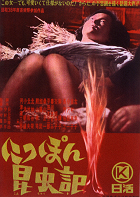Directed by:
Shôhei ImamuraCinematography:
Shinsaku HimedaComposer:
Toshirô MayuzumiCast:
Sachiko Hidari, Jitsuko Yoshimura, Masumi Harukawa, Sumie Sasaki, Kazuo Kitamura, Shôichi Ozawa, 北林谷栄, 小池朝雄, Teruko Kishi, Shoichi Kuwayama, Shigeru Tsuyuguchi (more)VOD (1)
Plots(1)
Comparing his heroine, Tome Matsuki (played by Sachiko Hidari, who won the "Best Actress" award at the 1964 Berlin Film Festival for the role) to the restlessness and survival instincts of worker insects, the film is an unsparing study of working-class female life. Beginning with Tome s birth in 1918, it follows her through five decades of social change, several improvised careers, and male-inflicted cruelty. Elliptically plotted, brimming over with black humour and taboo material, and immaculately staged in crystalline Nikkatsu Scope, The Insect Woman is arguably Imamura's most radical and emphatic testament to female resilience. (Eureka Entertainment)
(more)Reviews (1)
Sternness, rawness? Certainly - but it is also interesting to observe the means by which Imamura achieves this. The film spans several decades, capturing many collisions, crises, and vicissitudes, yet the narrative flows at almost the same pace, uncompromisingly not dwelling too much or too little on any of the subjects. Not only does this relativize their moral status, but it also achieves a detached narrative - the story flows almost homogeneously without interruption, allowing for an exploration of the characters' current inner selves. The film is analytically cold in this regard, keeping only what is essential from the characters' actions, from which their motivations and goals can be reconstructed, and trimming away everything else as unnecessary. However, this is not to say that Imamura cannot capture what is important, quite the contrary. In the end, what remains is just the "skeleton" of human behavior - money, sex, money for sex, or sex for money, trading future prospects for money, trading future prospects for sex. It is a formal finesse that in a film where the narrative does not pause where it "should," the camera and editing pause where they "shouldn't."
()

